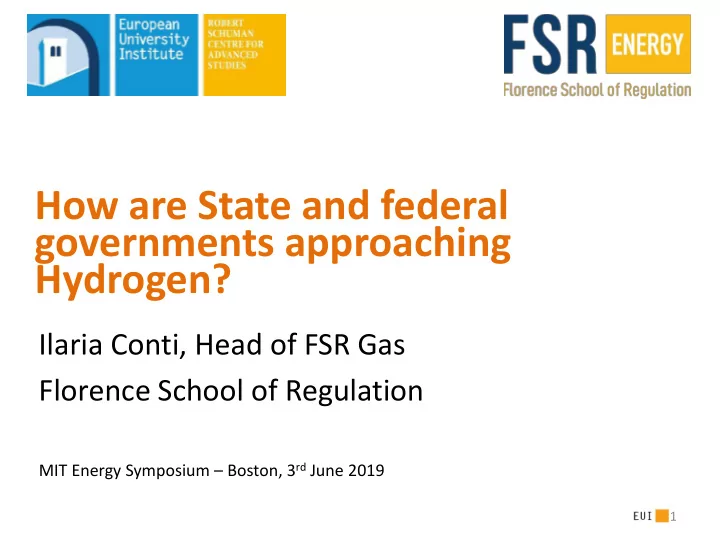

How are State and federal governments approaching Hydrogen? Ilaria Conti, Head of FSR Gas Florence School of Regulation MIT Energy Symposium – Boston, 3 rd June 2019 1
Hydrogen: the new re-discovery • 90% worldwide is used for ammonia (fertiliser), "I believe that water will one day be employed as fuel, that hydrogen methanol and for refining oil into fuels and basic and oxygen which constitute it, commodities for the chemical industry. used singly or together, will furnish • In Europe, Germany and the Netherlands are the an inexhaustible source of heat and light, of an intensity of which largest producers (around 10 bcm/y) coal is not capable." • About 10% of natural gas consumed in the Jules Verne (1874) Netherlands is used for the production of hydrogen. The Hydrogen Initiative, Sep 2018 In order to promote the potential of hydrogen for the supply of efficient, safe and clean energy for all users throughout Europe, research and innovation in the field of hydrogen technology must be further intensified. […] The acceleration of early implementation and wider application of sustainable hydrogen technology is able to contribute to the economic competitiveness of the Energy Union. (Signed by 25 countries) 2
Decarbonising the EU gas system: Madrid calling “The Forum agrees on the following no regret building blocks supporting the low- Infrastructure carbon energy transition , which represent (re)planning/ the priorities for upcoming work”. stranded Conclusions of the Madrid Gas Regulatory Forum, assets October 2018 Sector coupling/ Renewable integration gases: biogas, hydrogen , biomethane, Future role etc of gas: LNG, storage, etc CCS/ Methane CCU emissions 3
Regulatory and policy supporting Hydrogen in the EU • No overarching and structural policy for hydrogen development. • No statutory and regulatory provisions • Some EU and national schemes supporting selected areas , mainly transport (cars, buses etc ) and mainly via ‘no excise duties’ (like for EVs) or the roll -out of a basic infrastructure of hydrogen refuelling points. • In addition, innovation subsidies for hydrogen (industrial research, experimental development or demonstrations) at national level. Example: Topsector Energy in NL about 1m euro in 2017. • EU support for demonstration projects : – FCH JU (Fuel Cell and Hydrogen Joint Undertaking), a public-private partnership Horizon 2020. – TEN-E (Energy) and TEN-T (Transport) programmes supporting hydrogen infrastructure. Examples in the Netherlands include the TSO2020 synergy project run by Gasunie, Tennet, Akzo and partners as well as the H2Benelux project for the development of a number of hydrogen refueling points. – Interreg programmes, although the options are fragmented, not always transparent and often difficult to access. 4
Studies and projects • Dutch Climate Agreement 3-4 GW of electrolysis capacity in 2030. National hydrogen transport and storage infrastructure. In 2019-2030, the government will contribute EUR30 – 40 million extra subsidy per year for demonstration projects in the field of hydrogen. • Norway’s government is creating a national strategy for hydrogen technology R&D and use. Focus on production and storage, and uses in transport, particularly maritime. Also, looking at how a market for renewable hydrogen produced by electrolysis and powered by wind could be enhanced. • France’s hydrogen strategy with indicative targets for greening the current grey hydrogen used in industry. The government has set a target of 10% green hydrogen use in industry for 2022 and 20% to 40% for 2027. • Some industry players (Shell, Siemens, Tennet) aim to organise combined auctions of offshore wind fields for electrolysis, which would imply connecting the value chain in one single tender. • A new MI Innovation Challenge on Renewable and Clean Hydrogen (IC8), co-led by Australia, the EU Commission and Germany, announced in Malmö in May 2018: accelerate the development of a global hydrogen market by identifying and overcoming key technology barriers to the production, distribution, storage, and use of hydrogen at 5 GW scale
The current debate in energy: Power-to-gas Pros : • P2G technology is flexible and therefore suitable for the variable electric infeed. • Provision of seasonal flexibility and storage, building on existing gas network and underground storage. • It’s a versatile technology, synthetic gases can be used for industrial processes and heating and thus help to decarbonise other sectors. • Can help reducing RES curtailment Challenges to be addressed and overcome: • Only small P2G plants are in operation (up to 10 MW) and the production of synthetic gases is currently expensive. • Electrolysis manufacturing capacity needs to develop for the upscaling challenges. • Blending: in UK and Belgium, network limit for hydrogen is 0,1%. In Germany 10% and in NL 12%. 6
Existing gas infrastructure can be repurposed for P2G or hydrogen Source: Eurelectric 7
Challenges • At technical/infrastructure level: – Scalability: from MW to GW – Location – Operation: separate routes or blending? • At regulatory level: – framework of reference (definitions, network access and safety, etc) – Ownership – Incentives/targets 8
The EU regulatory framework of reference • Third Energy Package (2009) • RED II • Interoperability NC 9
In the pipeline • EU Gas Regulatory Forum (Madrid) next week: hydrogen is in the agenda on Day 1 • Ongoing CEER Consultation on Regulatory Challenges for a Sustainable Gas Sector (ch. 4.2 Regulation of hydrogen networks in the future) Public Consultation Paper • CEN • EU Gas Package 10
Thank you for your attention! Ilaria Conti Florence School of Regulation Head of FSR Gas European University Institute Ilaria.Conti@eui.eu 11
Recommend
More recommend